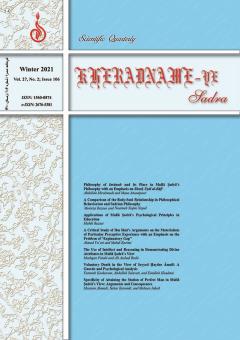-
-
List of Articles
-
Open Access Article
1 - ٍEditore NOte
S. Mohammad Khamenei -
Open Access Article
2 - Philosophy of Imāmah and its Place in Mullā Ṣadrā’s Philosophy with an Emphasis on Sharḥ Uṣūl al-Kāfī
Abdollah Mirahmadi Mona Amanipoor -
Open Access Article
3 - A Comparison of the Body-Soul Relationship in Philosophical Behaviorism and Sadrian Philosophy
Naeimeh Najmi Nejad Morteza Rezaee -
Open Access Article
4 - Applications of Mullā Ṣadrā’s Psychological Principles in Education
Mahdi Rezaei -
Open Access Article
5 - A Critical Study of Ibn Sīnā’s Arguments on the Materialism of Particular Perceptive Experience with an Emphasis on the Problem of “Explanatory Gap”
Ahmad Va’ezi Mehdi Karimi -
Open Access Article
6 - The Use of Intellect and Reasoning in Demonstrating Divine Attributes in Mullā Ṣadrā’s View
Mozhgan Fatahi Ali Arshad Riahi -
Open Access Article
7 - Voluntary Death in the View of Seyyed Ḥaydar Āmulī: A Gnostic and Psychological Analysis
Fatemeh Kookaram Abdullah Salavati Einollah Khademi -
Open Access Article
8 - Specificity of Attaining the Station of Perfect Man in Mullā Ṣadrā’s View: Arguments and Consequences
Maryam Ahmadi Sahar Kavandi Mohsen Jahed
-
The rights to this website are owned by the Raimag Press Management System.
Copyright © 2017-2026







